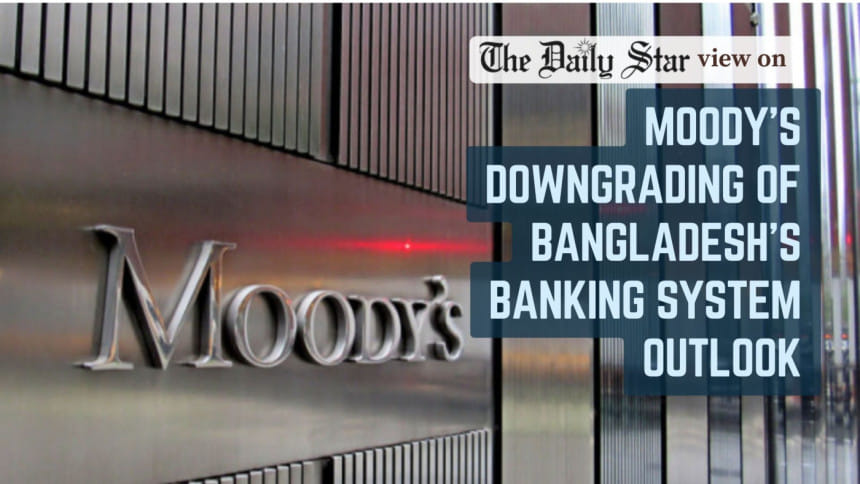Moody’s recent downgrade is a big blow

Moody's recent downgrade of Bangladesh's banking system outlook from "stable" to "negative" is deeply concerning. This marks the third time since 2023 that Moody's has downgraded Bangladesh's rating. Initially, the agency downgraded Bangladesh's sovereign rating, followed by the ratings of specific banks—though the impact extended beyond them. Now, it has downgraded the entire banking sector. Unfortunately, this series of events paints a bleak picture of the country's economy.
Given the previous downgrades, this latest development was not entirely unexpected. However, it could have been avoided had earlier concerns been addressed and negative trends reversed. As Moody's highlighted, key issues—such as deteriorating asset quality, high inflation, and slowing economic growth—continue to undermine banks' profitability and financial stability. The agency also pointed to "structural risks to banks' asset quality, such as lax regulations and poor corporate governance," which remain unaddressed. Meanwhile, the government is expected to continue supporting banks through regulatory forbearance and liquidity measures to mitigate contagion risks.
With non-performing loans (NPLs) on the rise, Bangladesh's banking sector faces mounting asset risks. In this context, the negative outlook also reflects the government's declining capacity to support banks in times of crisis. However, one silver lining is that Moody's expects liquidity across the banking system to remain stable, albeit tight.
This downgrade is likely to further erode investor confidence. Foreign investors may become even more reluctant to invest in Bangladesh, while existing investors could consider withdrawing. Additionally, banking transaction costs may rise, and opening letters of credit (LCs) could become more expensive, placing further strain on businesses and the economy.
The negative outlook reflects broader economic challenges, including prolonged instability and deepening financial sector vulnerabilities. Political uncertainty, concerns over law and order, and various forms of unrest are likely to have an even greater economic impact. Moreover, disruptions in supply chains—particularly within the garment sector—and weakening demand both domestically and internationally pose significant risks that the government must urgently address.
To restore confidence and improve its credit rating, Bangladesh must implement urgent reforms in both the banking sector and the broader economy. Strengthening corporate governance, enforcing stricter banking regulations, and addressing NPLs should be top priorities. The government must also enhance regulatory oversight, ensure better risk management practices, and increase capital buffers in line with Basel III standards to bolster financial resilience. Additionally, fostering transparency, reducing political influence in lending decisions, and promoting financial inclusion are essential to help rebuild investor trust.


 For all latest news, follow The Daily Star's Google News channel.
For all latest news, follow The Daily Star's Google News channel. 



Comments